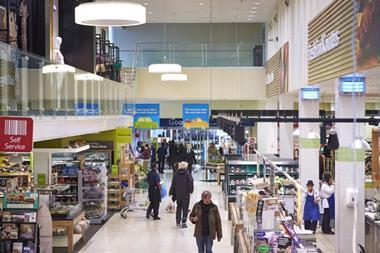Today is hopefully start of a new chapter for Tesco from a disclosure perspective, where a line of sorts can be drawn under what one can only hope has been the darkest hours for the group
The accounting issue is NOT only an H1 FY2015 matter, which raises all sorts of questions to our minds as to what has gone on in prior years; Deloitte suggest that £263m is a reasonable statement of the discrepancy. We cannot, therefore, rule out that a lot of ground will have to be raked up with potentially time consuming and damaging ongoing headlines for Tesco. If there is a silver lining here then it is that Mr. Lewis has acted quickly, decisively and that he is not associated with the practices.
Clive Black, Shore Capital
We are faced with an extremely challenged UK business, an Irish operation that remains in freefall and a patchy performance in Central and Eastern Europe and Asia. Naïve hopes that the flamboyant accounting practices were limited to a six month period have been scotched, hinting at a systematic and long-term breach of standard practice in terms of accounting for supplier rebates and promotional monies.
Read this: Tesco confirms £263m profit hole
Around the massive clouds that engulf Cheshunt, there are a few tantalising glimpses of silver lining. A strong position in online and convenience remain Tesco’s structural strength in the UK and the turnaround in select Eastern European markets appears to be on track.
Many unknowns, understandably given the short duration of Dave Lewis’ tenure, remain. There will inevitably be some spin-offs and disposals to restore focus and generate funds and we also await some guidance in early 2015 on what the strategy will be to reinvigorate the UK business. Arguably, the only way is up.
Bryan Roberts, Kantar Retail
This morning’s results show how retail giant Tesco has been rocked to the core by the accounting scandal – with a string of key executives now on the suspended list and every painful twist and turn gleefully documented by both specialist and mainstream media. Not that they want for material, either. Like-for-like declines in almost all markets - including the UK – are now the norm for a company that seems bereft of any solution that might arrest its vertiginous decline.
Although a UK recovery plan - remember that? - is still in place, even here investment is being yanked, meaning FY14 store refurbishment targets will now no longer be met. This is a major concern, considering more than half of the Express outlets and Tesco superstores have yet to be refreshed. New CEO Dave Lewis will, without question, have to consider selling peripheral businesses like the Blinkbox movie streaming service or Dobbies garden centre chain to raise much-needed cash to put into store revamps.
Read this: Tesco boss Lewis sets out three-pronged turnaround plan
Even the international business, once Tesco’s dependable wingman in a tight spot, is showing less heart for the fight. With like-for-like declines erupting like a rash across almost all of Tesco’s nine key international markets, the pressure on the new CEO to act decisively will be ratcheted up even more. Drastic Dave may well have to live up to his moniker and implement extreme measures –the sale of peripheral operations such as Kipa Turkey is not entirely out of the question.
But Tesco, although down right now, is not quite out cold yet. It remains the UKs most profitable grocer – for the time being at least. Not to mention one of the world’s biggest convenience store players. Whatever the chaos raging around Chesham HQ, Tesco continues to demonstrate adaptability in this channel – rolling out mini c-store formats across Korea and Thailand. Longer term, these will provide a growing revenue stream – providing a buffer against declines elsewhere. We expect Tesco’s global convenience store sales to rise to almost GBP11 billion by 2018, from GBP6.9 billion currently.”
David Gray, Retail Analyst at Planet Retail
The task of rejuvenating the company has been made all the more difficult in light of the accounting irregularities, which have been investigated by Deloitte. The outcome of this is that Tesco overstated profit by £263m, slightly more than the £250m first anticipated. While the Deloitte investigation is now concluded Tesco cannot draw a line under this incident until the official investigation by the FSA is complete. We believe that this is serious, albeit entirely necessary, distraction for a business that needs to be completely focused on its trading activity.
What was largely absent from today’s update is a sense of the strategy Dave Lewis will employ to enact changes at Tesco. This is to be expected as today is about financial performance and not the time for unveiling grand plans. However, in our view it is necessary for Tesco to spell out, and enact, this strategy sooner rather than later. At present the perception is of a company drifting in a sea of various crises and it is important for someone to place a firm hand on the tiller and guide Tesco back to the calmer waters of growth.
Neil Saunders, Managing Director of Conlumino
Tesco is in turmoil. Strong competition in its core UK market is only the tip of the iceberg, too.
Structural changes in the grocery sector have placed Tesco’s entire model under threat. Sir Richard Broadbent’s decision to fall on his sword was, on balance, the right one. Unlike Dave Lewis, he has been there throughout. Tesco needs a clean break from this sorry saga and, through Sir Richard Broadbent’s departure, will have the best chance of achieving it.
Read this: Tesco crisis - timeline
The presence of accountability will restore a degree of faith. That the overstatement of profits is slightly higher than originally thought is another turn of the knife.
The fact that Tesco has chosen not to provide full year profit guidance underlines the extent of its problems. For Tesco, it really is do-or-die time. If there’s one positive, it’s that Tesco is still a formidable player in the grocery market and is teak tough. Despite its current crisis, it is still in the game.
Phil Dorrell, director of Retail Remedy
It isn’t all gloom and doom for the retail behemoth though as recent sales performance has improved which may be cause for optimism. However, what shareholders will want to know is why the supermarket chain has been so slow to respond to the seismic changes in consumer buying behaviour, when rivals like Asda and Morrison’s already made swift changes, and whether it has the management bandwidth to continue that improvement as we move into the important pre-Christmas trading period.
CEO Dave Lewis will now be concentrating on a strategy that can compete with Aldi and Lidl’s unwavering success whilst also addressing the shift in consumer demand from supermarket to convenience shopping. The question is, will it be too little too late for what was once Britain’s favourite supermarket.
Julie Palmer, retail expert at Begbies Traynor



















1 Readers' comment